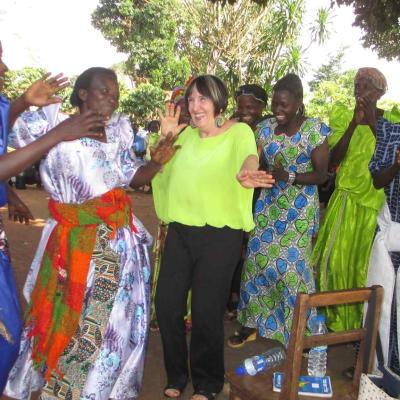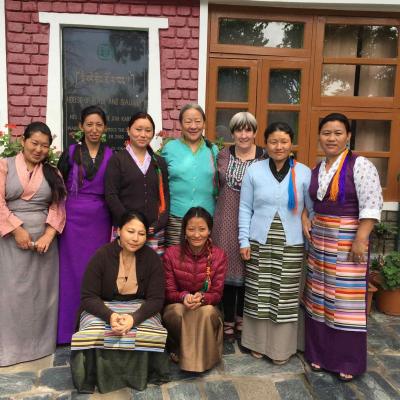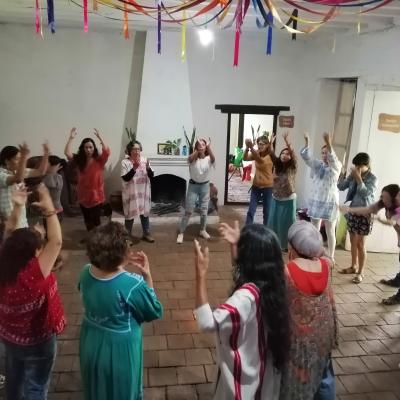Understanding Rumi: The Heart of Sufism
1999 by Sharon G. Mijares, Ph.D.
Published in Visions Magazine 1999
To truly understand the poetry of the 13th Century Dervish known as Jelaluddin Rumi (1207-1273), we must enter into the heart and experience of mysticism as it is expressed in the Sufi tradition. In Sufism we can find a depth of knowledge concerning the mind-body relationship and also a tradition that acknowledges all the love, harmony and beauty at the core of all religions.
Rumi (a nickname describing one who has traveled) was acknowledged by Sufis when he was still a child. They saw his great future. His father was a Sufi, and Rumi was educated in this tradition. Thus Rumi developed into a respected intellectual, teacher and philosopher. At least this was his role until he met the wandering dervish, Shams of Tabriz. Rumi threw his books away for he had met the teacher and illuminator of his heart. He was now the student. Rumi translator Coleman Barks quotes him as saying, "What I had thought of before as God, I met today in a human being." This is one of the secrets of the Sufis.
The Sufi mystic seeks union with the Beloved—and this Beloved is Allah (the non-gendered Presence from which the universe manifests). The teacher-student relationship is a relevant element of the Sufi experience. The student has been drawn to this teacher through an inner recognition—one could say that the student is drawn by the atmosphere of the divine breath. In Sufism is it acknowledged that Love, Lover and Beloved are one. The teacher has touched the Beloved and her or his heart has been opened to Love. This is not the warm, "feels good" experience that can be lost at a moment’s notice; but rather an incomparable union of hearts that goes beyond any romantic ideal or mental concept. This is the fire that illuminated Rumi’s heart, teachings and poetry. Nothing mattered after this union.
Listen to his words,
If you want what visible reality can give you,
you’re an employee.
If you want the unseen world,
you’re not living your truth.
Both wishes are foolish,
but you’ll be forgiven for forgetting
That what you really want is
love’s confusing joy.
And gamble everything for love,
if you’re a true human being.
If not, leave this gathering.
Half-heartedness doesn’t reach into majesty.
You set out to find God,
but then you keep stopping for long periods
at mean spirited roadhouses.
Rumi knew the truth of experience. He did not stop short on his journey. When Rumi heard of Shams death, he was in great sorrow. It is said that he began turning around a pole in his grief as he lamented the outer loss of his teacher. As he turned around this pole, he held it with one uplifted arm. The other arm was outstretched in expression of his love. Streams of love and longing propelled his movement and his ecstatic experience initiated the movement of the Whirling Dervishes. From that moment on Rumi whirled as poetry streamed through him. His body and being were united with the fire of Love.
Today, almost seven centuries later, the Whirling Dervishes still turn in honor of Mevlana (the great Master) Jelaluddin Rumi as they continue the lineage. The turning is a tradition that requires years of training and dedication to the teacher (in America this is Jelaluddin Loras, the head of the American Mevlevi Order of Whirling Dervishes). This teacher carries the transmission of Rumi’s heart. Turning in ecstasy, the dervish experiences a taste of the Divine. This is the Love spoken of in Rumi’s poems.
Rumi also addressed the mind-body relationship in depth. The Dervish turning brings body and soul into unity with the source of the universe. True Sufis are knowledgeable in the art of the alchemy of transformation. This includes training in the use of breath, sound and movement. Dr. Neil Douglas-Klotz, a Sufi teacher and author of several books on Middle-Eastern mysticism explains that "Movement in Sufism is used to both gain increased awareness of aspects of the personality as well as to develop a sense of the transpersonal, a view not limited by what one currently believes to be personality limitations." In other words the movements guided by those carrying the transmission of Rumi and other great Sufi masters take us beyond the personality and its limiting identity.
This knowledge of body, movement and breath is integrated in a modern-day manifestation from Sufism found in the Dances of Universal Peace. Most certified teachers of the Dances are dedicated to alchemical transformation involving the body. Trained Dervishes experiencing the turn as well as experienced Dancers of Universal Peace awaken to the message of Rumi moving in the breath igniting the heart and illuminating the body. This subtle training awakens awareness and initiates alchemical transformation on many levels.
In Delicious Laughter, Coleman Bark’s shares a Rumi poem "A goal kneels."
The inner being of a human being
Is a jungle. Sometimes wolves dominate,
Sometimes wild hogs. Be wary when you breathe!
At one moment gentle, generous qualities,
like Joseph’s pass from one nature to another.
The next moment vicious qualities move in hidden ways.
Wisdom slips for a while into an ox!
A restless, recalcitrant horse suddenly
becomes obedient and smooth-gaited.
A bear begins to dance.
A goal kneels!…
There is much to contemplate in the poem’s last lines for they reveal an in-depth understanding of the archetypal forces of the collective unconscious moving through the cellular structures of the body-mind. Rumi then leads us toward more…
At every moment a new species arises in the chest—
now a demon, now an angel, now a wild animal.
There are also those in this amazing jungle
Who can absorb you into their own surrender.
If you have to stalk and steal something,
steal from them.
Why are we all reading Rumi? Perhaps this 13th century Dervish poet and his poetry are leading us toward something. Are we listening to an inner prompting of the heart? Are we longing for something more meaningful to lead us into the new millennium? In a world united by Internet and other rapid-fire communication forms, Rumi is speaking of the one true Love that unites us all.
***
Sharon G. Mijares, Ph.D., is a member of the International Association of Sufism http://www.ias.org/ ; A Remembrance, A Review the Sufi Women’s Organization; the Sufi Ruhaniat International http://www.ruhaniat.org/ and its related association, PeaceWorks/the International Network for the Dances of Universal Peace. www.dancesofuniversalpeace.org/ If you have questions about Sufism and/or the Dances, please call Dr. Mijares at (760) 436-3518.






